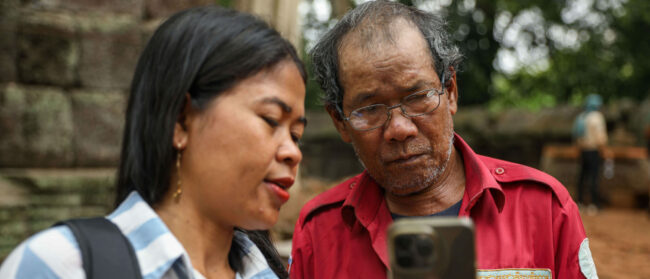Food and identity among the Cambodian American diaspora
Food is an essential part of life. The food that we eat, the food that we crave, and the food that we choose to put into our bodies play a deep role into our identity and how we see ourselves
By the Cambodian American Literary Arts Association
Food is an essential part of life. The food that we eat, the food that we crave, and the food that we choose to put into our bodies play a deep role into our identity and how we see ourselves.
How we eat – whether it is with forks and spoons, chopsticks, or directly with our hands – shows a glimpse of who we are. Eating is a personal and intimate act that we share with ourselves and with our family, friends, and community. In addition, we expect certain foods at particular religious and cultural events and celebrations, further playing a role in our sense of identity.
Essentially, you are what you eat and The Stilt House Zine, the literary magazine of the Cambodian American Literary Arts Association, wants to know: How does the food you eat shape your identity?
Broth and Bones
By Sasha Rath
“Khom jowel!”
My brothers and I share a joke about my mother’s number one Cambodian phrase which means “Don’t throw that away!” I bet that was the first full sentence each of us said as babies. Always having had so little, my mother figured out how to use everything completely, especially when it came to food and water.
Most Southeast Asian meals are soup entrees with rice on the side. If there was another entree, it always had a soup complement. The best part of the meal was the broth. The shrimp, lotus stems, and baby bok choy that floated around in the pot were more ornamental than central to the dish. No liquid was ever left uneaten.
The book Stone Soup was first read to me (and my class of 25 or so) by my kindergarten teacher. My class was mostly made up of kids like me, children of Cambodians who recently arrived in the States. I remember going home and thinking how the poor boy in the book was most likely mistaken. The stone in the story surely must have been a big bone because that was what my mother always used to start her soups.
I grew up cherishing the liquid that held the vegetables and small bits of fish or chicken. So when I was dating my Midwestern-raised boyfriend, it was painful to watch his blond daughters pick out all the solid bits and ignore the sauce, or scoop up all the chicken and leave the curry. I took the opposite approach, using the solid elements to savor every drop of precious sauce.
That was a decade ago, and since then my presence has infused our blended household and given the children new tastes and habits. One of the expectations I have from my upbringing is that children can contribute around the house. So our kids take turns making dinner.
These cooking responsibilities have given them an appreciation for the work that goes into making a meal and the satisfaction of doing it well and serving it to others. Learning to blend seasonings, create roux, and make gravies and curries has also enhanced their dining experiences.
Our family rarely dined out, so stay-at-home orders did not affect our meals much other than that our children are now stretching their cooking experiments and learning to fully utilize what is available in the house.
“Khom jowel!”
My mother is sure to lay claim to leftover broth and bones to use as the basis of her soups.
Most recently, my step-daughter dressed and cooked a whole chicken in the Instant Pot. It was moist, tender, and flavorful. As she cleaned up, I anticipated that the leftover liquid, full of nutrient and flavor, would be sent to the garbage bin. But before my mother could say “Khom jowel!” about the remains, someone else piped up.
“Can I save the broth to make chicken soup?”
To my pleasant surprise, our sixteen-year-old already had plans for how she would salvage this valuable half-gallon of home-made chicken stock.
My mother was so tickled, she said she’d just take the bones.
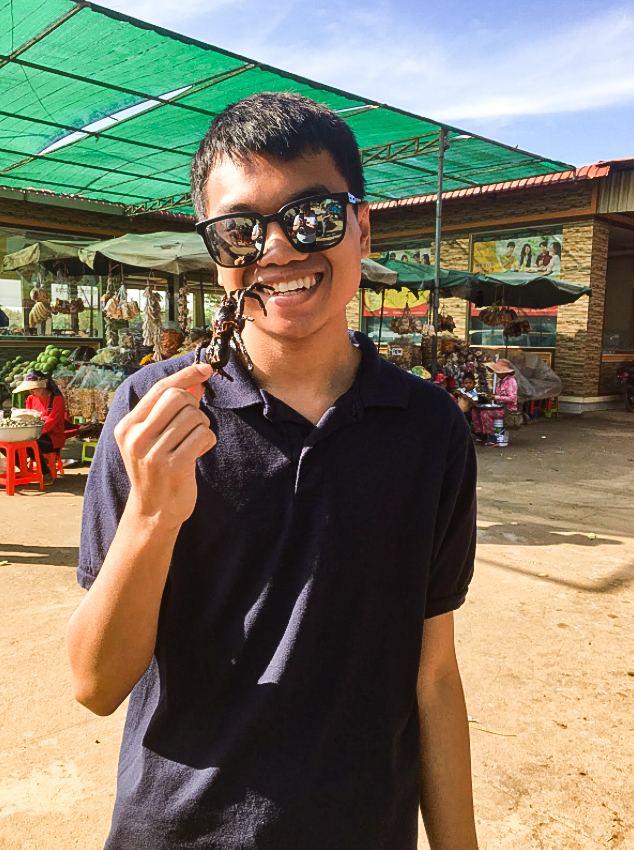
Tasting Tarantula
By Charlie Pheaktra
On our way to Siem Reap,
The bus stops at a market
Known for selling fried bugs
Mounds of tarantulas await,
Curious tourists with tastes
For a Cambodian treat.
As a Khmer who grew up in America,
In a white family without the comforts
Of my people’s food nearby,
I walk over to the pile of arachnids,
Wanting to try all the Khmer food
I can before I have to go back
To the United States.
I put the bug up to my lips,
The hairy legs fried to a crisp,
Biting down to hear a satisfying
Crunch…
It tastes just like a pork rind.
I’m Not Hungry Anymore
By Bunthay Cheam
Do you know how it feels to be hungry?
I mean, really, really hungry? Like, starving?
I can still taste the grit and dryness that betrayed my expectations when I took that first bite into the discarded banana peel lying in the middle of the dirt trail. My stomach was churning in its void. It was full of hollowness and as it talked to me through long deep moans and erratic pops, I felt it slowing, beginning to turn on its own walls as if it were consuming itself.
My days were spent quite lonely; Ma and Pa were far off in the chaka I’d assume, but to be honest I’m not exactly sure where. By sunrise they had disappeared with all the others, sinking into the landscape of rice fields the further they walked. More often than not, it wasn’t until the sun went down that I’d see them again.
I spent days along these red dirt trails by myself; waiting, thinking, hungry, imagining. There was an old lady, I’m not sure of her age–a real old lady that I’m not even certain could even hear the sound of my voice nor had the vision to see my 4 year old famished body–who I assumed was supposed to be my caretaker while Ma and Pa were out working.
She never did, though. The only words uttered my way were, “go outside and play.”
So I spent many days alone, many times accompanied only by my hunger, the only feeling that took the time to stay by my side through the hours of isolation, the only feeling that was strong enough to hold on, strong enough to burrow a place into my gut.
Sometimes (most times), I’d stay close to the thatch bamboo houses where we lived and spent all day pacing back and forth along the trail closest to us. Once in a while I’d gather the courage to go beyond, just up to the woods on the edge of the rice fields.
One day, I decided, things would be different. This time I’d walk all the way to the rice fields hoping to catch a glimpse of Ma and Pa. As I approached the woods, I decided to take a shortcut through them and at the same time use it as cover from any Khmer Rouge.
As I made my way through, a man suddenly surprised me. He was leaning against a tree smoking a cigarette, sleeves rolled up, relaxed with a slight grin of satisfaction as if he just succeeded in the kindest of deeds.
He was dressed differently than all of us. He wasn’t dressed like a Khmer Rouge soldier nor was he dressed like Ma and Pa; instead, he was draped in all-green camouflage.
I stood there frozen with surprise. He noticed me after several seconds, then turned to me and gave me a wide grin. Our eyes met and as they did so, he took slower and longer drags on his cigarette. Then leisurely, he took his cigarette from the corner of his lips as if to give them more space to grin. He brought his index finger to his lips.
I stood there for a few moments and then looked around to try to see what it was that I was supposed to be quiet about. Then I noticed something several feet in front of him, something with a moist glisten, partially covered by black cloth.
As he continued his slow drawn out puffs of vindication on his cigarette, I slowly took steps closer, cautiously and quietly to get a clearer picture. When I realized what it was, I stopped dead in my tracks. It was a Khmer Rouge soldier. I could tell by the hat and the flip flops made of discarded tires; they looked nicer than what Ma and Pa wore.
I stood there in an almost calm disbelief and rather than feel pity and disgust for what I was looking at, I marveled at how it was possible that what was in front of me was a human being; it blew my mind.
How this managed to happen without detection by anyone else, I’ll never know.
I stood there for a while, wordless as did he, staring, sharing the silence, interrupted by the occasional sounds of indistinct yelling far off in the fields.
It was the first time, in a long time, that I didn’t feel hungry.
A Simple Recipe (Ginger Meat Stir Fry)
By Sithis Yim Samnang
Ginger is expensive, here,
and meat, too, Mak.
Simple quickly prepared dish
because you spent
the entire day stuck on
the wheel of tailoring;
the entire day, await
the presence of your sons;
the entire day, thinking of
how to say “I love you”
And so you made us food.
Cut the ginger,
Splinter it,
so each bite is as spicy as another
each splinter as fractured as another
Cut the meat,
feel the tenderness
of its flesh,
of your own,
of your mother.
Separate them,
yours from your family
as you grow a self under
your skin.
To cut them
To cut yourself off
For independence
of the taste
of the fragrance
of the spice
But to mix them for one
mouth-watering dish
as the stove fully ignited.
The fragrance of self
from the ginger.
The taste of a family
from the meat
The balance of independence
from the bowl of rice.
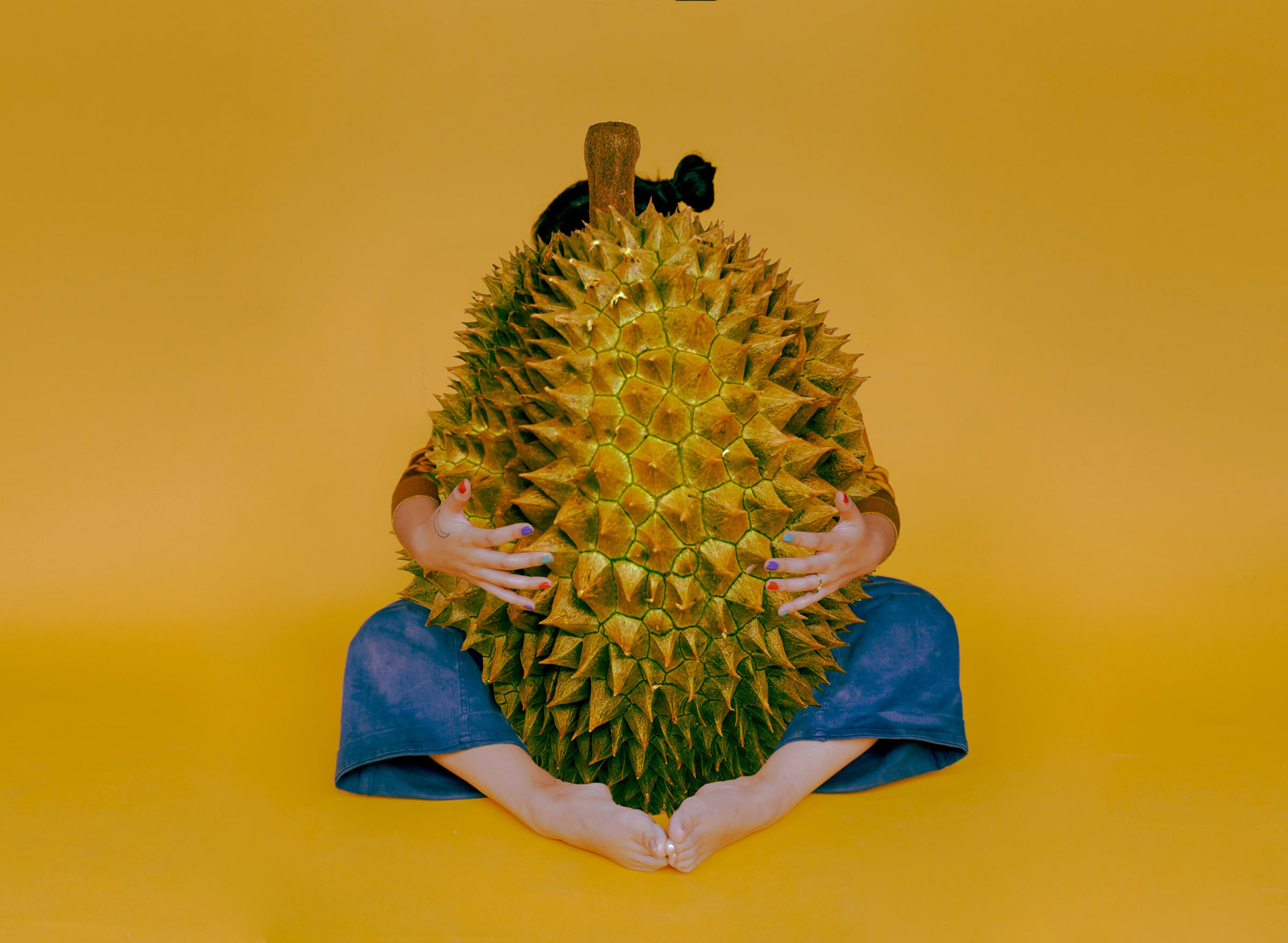
Ode to Durian
By Mel Taing
When I first met you, I didn’t have the language to call you by your name. Instead, I opened my mouth so I could taste you on my tongue. I think I understand you better this way — by taste alone. I listen to my senses, and I leave the senseless people behind.
People like to complain about you. They say you stink. They call you weird and gross. I was told that my white uncle passed out when they brought you to a family gathering. I couldn’t understand why. I think you’re heavenly.
I’m always searching for you because you’re hard to find in this part of the world. You don’t travel well, and I know that airports have given you grief for years. It’s not fair that people treat you this way. You’re perpetually misunderstood. It’s as if the language you speak cannot ever be translated in this country. I feel like I have to give all these disclaimers about you. I tell people not to be alarmed by your spikes. I attempt to prepare people for your scent, knowing the second they encounter this, they’ll back away in disgust. I stumble on my words as I try to explain the way you slide effortlessly between sweet and savory. I mention all these other familiar tastes in the hopes that they could understand — flavors like mango and banana and onion. I don’t know why I try so hard. You’re ineffable.

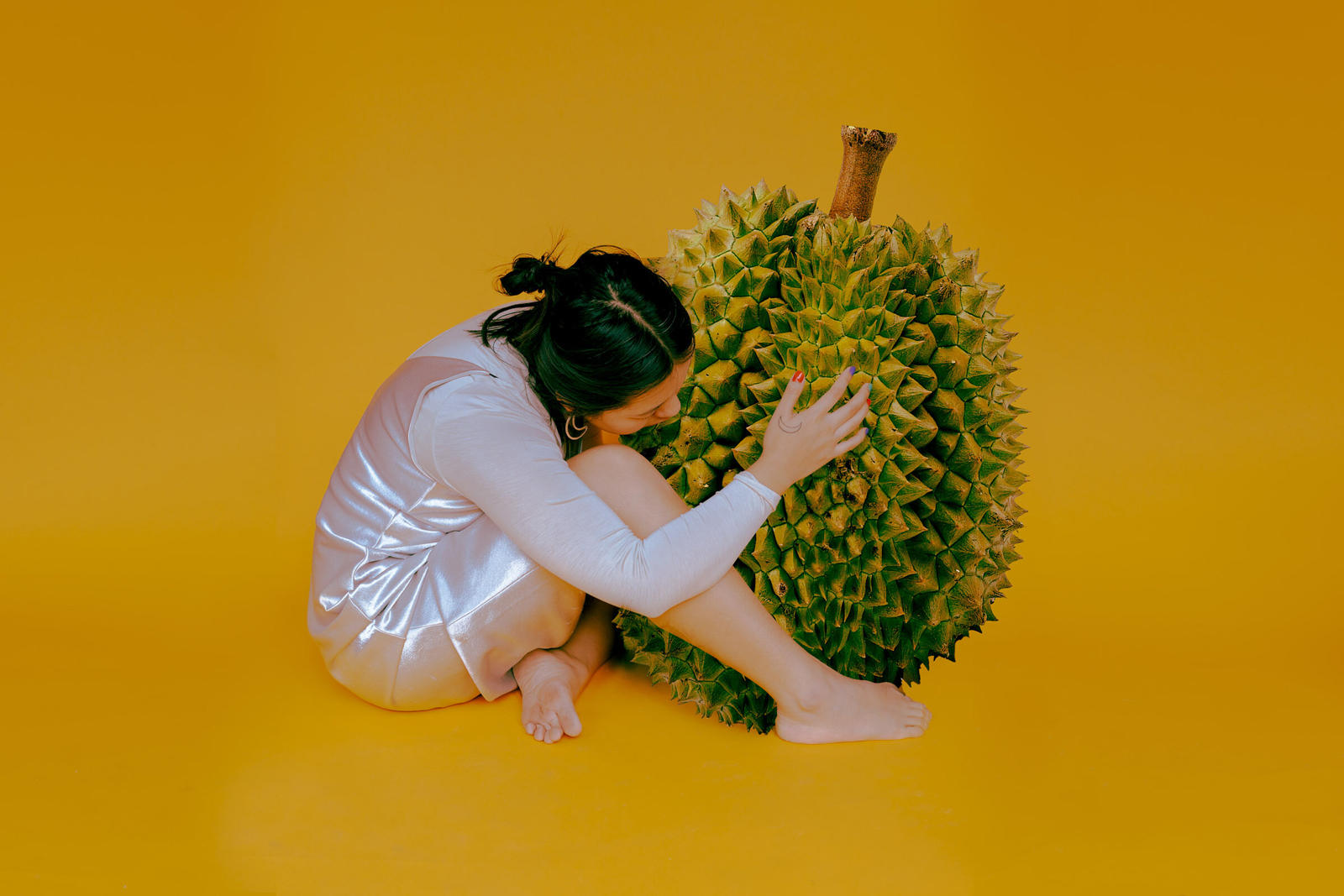
To be honest, I see so much of myself in you. I see it in the way we slide between different modes. I see it in the way people struggle to understand us. Do you know how hard it is to try to explain how I got here? I try to condense my life story into only a few sentences, to package the narrative into something cohesive and consumable. I warn people that my story is a war story. I try to prep them for words like “genocide” and “starvation” and “bombing.” Sometimes, it feels impossible — connecting the dots between my war-free American upbringing and my parents’ tragic war-torn trauma. Like trying to connect bananas with onions.
Bananas, onions, Cambodian, American… These things are just a part of us, right? We don’t need to justify these seemingly opposite things. We don’t need to always explain who we are. You certainly don’t need me to do it for you. You don’t care how you smell. You offer yourself humbly to the world — take it or leave it. Love me or hate me. Accept me or reject me. You don’t care either way. You know who can handle you. You know who can hold space for you. Evolution has taught you to armor yourself. I have much to learn from you, dear Durian.
Every time I taste you, I am filled with a deep sense of belonging. You are the bridge back to the motherland I’ve never been to. Even though we were born on opposite sides of the world, I will always cherish what we share — complexity. A shared story that cannot be contained into a single flavor. We are ineffable. You are my perfume, and I’ll wear you like armor.
Homecoming
By Moleca Mich
Midnight—
Steam escapes the rice cooker,
rises into the kitchen air and in an encounter
repeated innumerably throughout generations
the sweet fragrance of jasmine rice
meets the simmer of somlaw machu on the stovetop.
The aroma of kreung drifts towards the doorway,
passing pots rooted with the kaffir lime trees
attentively cultivated to aid in its creation:
reshly plucked leaves now accompanied with
lemongrass garlic galangal shallots turmeric
amalgamated in stone by mortar and pestle.
Mak and Pa greet me as I take off my shoes,
my body weary from travel across state lines
and a workday so inundated that my mind
relinquished its need to eat again,
carelessly forgetting the hunger that my parents endured
because they believed in a future worth surviving for.
I eagerly approach the warm meal that awaits me,
feeling my shoulders ease
and my stomach remembering to rumble.
When the first spoonful reaches my tongue,
it fills me with a gratitude profound.
I am home.
“Chan Srak”
By Malisa Kuch
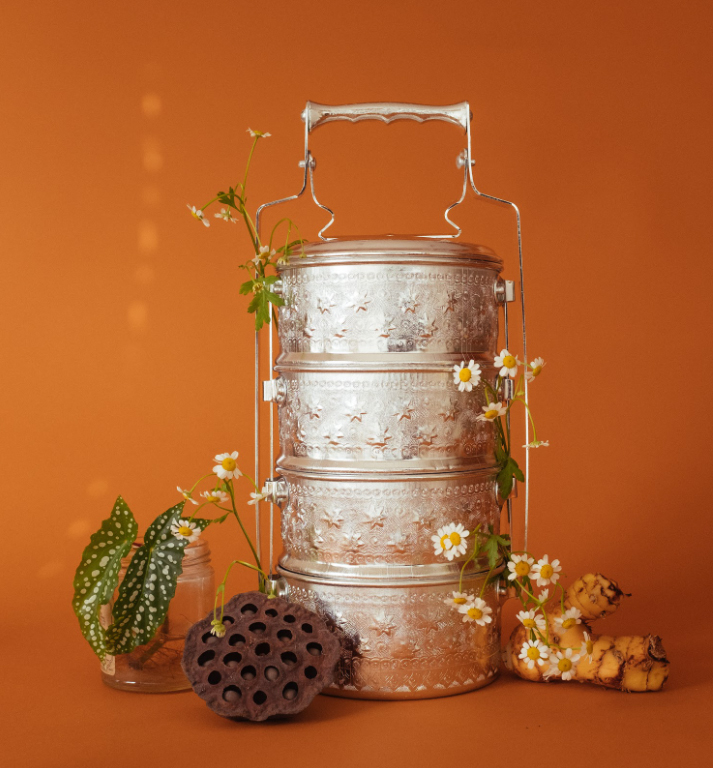
A reflection on food and ceremony.
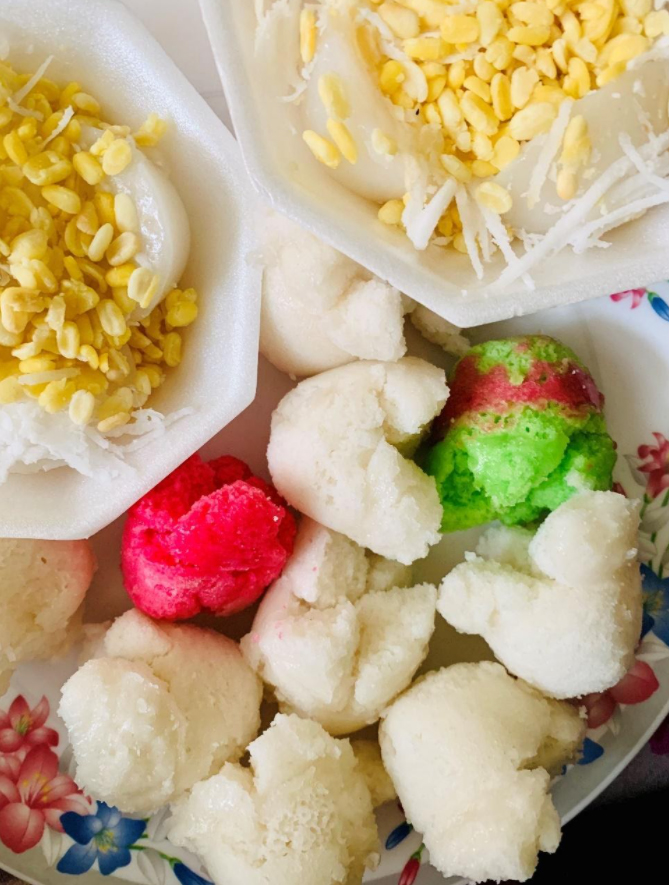
Enjoying Khmer Desserts in Battambang, Cambodia
By Jenny Rathana Par
My father’s side of the family is from Battambang. For the longest time, I wondered what life was like, what the people were like there.
In January 2020, I had the opportunity to visit Battambang with my husband and son. While there, we met my aunts, uncles, and cousins for the first time.
We also enjoyed these delicious Khmer desserts called nom a kouw (steamed rice cakes).
Ma’s Canh Chua Recipe: April-December 1975
By Kevin Park, Channbunmorl Sou, Mylo Lam
Poem by Mylo Lam
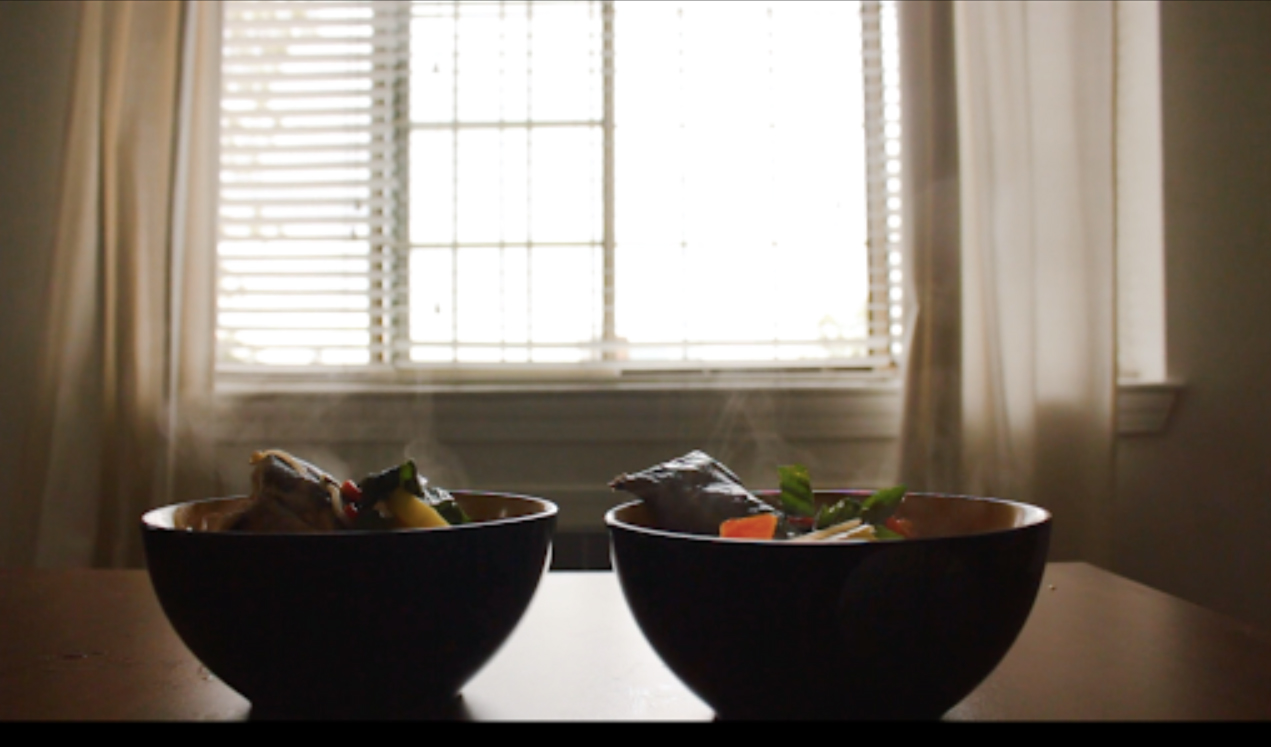
Canh chua, translated as “sour soup,” is a tamarind-based stew that originated in the Mekong
Delta.
Ingredients
¾ cup of “I barely know this man”
½ teaspoon of “I barely know his father”
6 cups of “I guess we’re all running away together now”
2 tamarind pods – picked from the tallest tree in the middle of a storm
1 pineapple – quartered and sliced (good luck)
2 tomatoes – quartered and sliced (good luck) bean sprouts – as many as you can get your hands on
1 catfish – avoid the blood swimming downstream, if possible Protein alternatives:
• 1 handful of escargots (i.e. edible snails)
• 1 non-venomous snake (go for the head with a blunt object)
8 cups water – again, avoid the blood Dash of whichever herbs and spices you can scrounge or barter for:
• Thai basil
• red chili pepper
• garlic
sugar (get some from a fruit?)
1 deck of cards
Instructions
1. Two weeks before April 17, have a dream. All around you is fire except for a 40-foot statue of Quan Am off in the distance.
2. Flee Phnom Penh. When your boyfriend tells you to run away with his family, refuse. That relationship isn’t going to last anyway.
3. Be on the run for two weeks. Then, while running through the fields, see your boyfriend and his father chasing after you. No one else in their family is with them.
4. For safety reasons, collect ingredients late at night/early in the morning and with a lookout.
• For the tamarind, have someone at the base of the tree, ready to catch it.
5. Add water to a pot and bring to a boil.
• While water boils, play cards to pass the time.
6. Add catfish/escargots/snake to pot.
7. Add sugar.
8. Smash tamarind to a fine pulp (feel free to use same blunt object used to kill snake).
• As your boyfriend sits there, realize you’ll probably have his children.
• Look over to your boyfriend’s dad, realize he’ll be your father-in-law.
• Say nothing.
9. Add tomatoes and cook for 2 minutes, then turn off heat.
10. Toss in bean sprouts, garlic, and Thai basil.
11. Quietly enjoy this meal.
12. Eight months later, get to the border of Vietnam.
• Wait until the sun rises on January 1st.
• Have your future father-in-law use what little Vietnamese he knows to get you in.
• Hope you can get the ingredients needed to make proper canh chua.
13. Have a dream you’re walking down a narrow concrete stairway, leading to the outside. At the base is a two-headed snake gazing at you. • Realize you’re pregnant with your first daughter.
This poem was originally in the Summer 2019 Issue of The Coachella Review
មួយគ្រាប់ One Grain
By Sokunthea Oum
មួយគ្រាប់ មួយគ្រាប់ (muy kreab muy kreab)
One grain one grain
ត្រូវតែរើសរាប់ផងដែរ (trauvte reus reab phng der)
Must be picked up, count also
កូនត្រូវតែដឹង (kaun trauvte doeng)
My child you must know
អង្ករមួយគ្រាប់ហ្នឹង (angkor muoy kreab hnoeng)
This one grain of rice (husked)
បានប៉ះ ញើសនិងទឹកភ្នែក (banpah nyheusa ning tukaphnek)
Have touched sweats and tears
រែកទឹក រែកដី (rek tuk, rek dei)
Carry (with a bar across a shoulder) water, carry soil
លើកឡើង ពីព្រឹកដល់យប់រាល់ថ្ងៃ (leuk laeng pi pruk dl yb ral thgnai)
Lift climb from morning until night daily
ចេញពីគ្រាប់ស្រូវមួយ (chenh pi kreab srauv muoy)
From one grain of rice (unhusked)
បណ្តុះបានពីរបីកួរ (bndoh ban pi bae kuor)
Can produce two, three clusters
អញ្ចឹងទៅ ត្រូវតែដឹង មួយគ្រាប់ ហ្នឹង (anchung thauv, trauvte doeng muy kreab hnoeng)
Therefore, (you) must know this one grain
តម្លៃទំងន់ធ្ងន់ជាងមាស (tomlei tomngn thngon cheang meas)
Value weights heavier than gold.
អ៊ុំសុគន្ធា (Oum Sokunthea)
ថ្ងៃទី ២ ខែមិថុនាឆ្នាំ ២០២០ (June 2, 2020)
This programme is supported in part by a grant from the Lowell Cultural Council, a local agency which is supported by the Mass Cultural Council, a state agency. This issue is also supported in part by the Literary Arts Emergency Fund.

